In the opening lines of her 2021 talk for TEDx South Lake Tahoe, Alycia Anderson spouts off a few audacious comments she’s received over the years, ranging from well-meaning to cringe-inducing. “‘You are so brave. I could never, ever, ever live like that,’” Anderson mimics good-naturedly. Onstage from her wheelchair, she delivers her resilience-themed talk “Disabling Ableism: A Modern Pathway to Inclusion,” sharing the obstacles and assumptions she’s faced, and offering ways people can shift their mindset around the capabilities of disabled people. “Our differences are our strengths,” her speech concludes. “They are core to what makes us uniquely able.” Her principal idea — that embracing inclusion will only enrich your life and improve your business’s bottom line — is as moving as it is pragmatic.
Anderson knows how to sell an idea. Formerly a sales executive for software-as-a-service technology, she has over 15 years of sales and marketing experience. Until mid-2021 the Roseville-based professional worked at the customer relationship management software company Knock as vice president of sales, a role in which she excelled but recently bowed out of, thanks to a rewarding and flourishing side hustle as a speaker, advocate and changemaker for accessibility and inclusion. Now CEO and founder of The Alycia Anderson Company, she speaks to corporate America (Abercrombie & Fitch, Arizona State University, and National Apartment Association are clients) delivering keynote speeches as well as more actionable addresses to human resource departments.
Anderson travels all over the country to deliver speeches and
consultations to national companies. She also does so via Zoom
from her home office in Roseville.
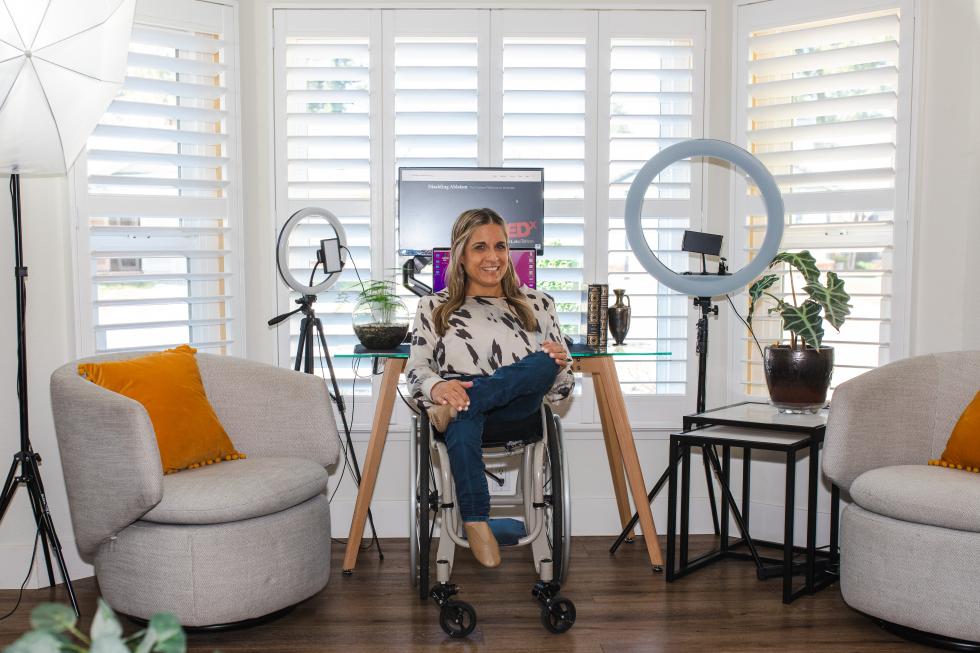
Whether she’s speaking on stage or in a boardroom, Anderson notes organizations are all ears. “There’s a ton of interest,” she says. Still, she senses hesitancy among professionals unsure how to approach conversations around inclusion. “People are really scared to offend or say the wrong thing.” To get both employers and staff to feel more comfortable, she encourages a people-first approach through a message she calls Heart of Inclusion. “It’s all about human connection and seeing the person first. … Then we’re open to sharing and learning from each other.” Anderson also created a global inclusion education program on behalf of the International Paralympic Committee, a dream job she was commissioned to do while earning her master’s degree from KU Leuven in Belgium.
Growing up in Tustin in Southern California, Anderson was seen not only as a disabled person, but as an identical twin. Throughout her childhood she felt as though she was “chasing around her able-bodied other half.” But rather than focus on comparison or perceived shortcomings, the experience of striving to be included in her twin sister’s activities, such as Girl Scouts and sports, informed her journey to independence and inclusion. “People generally think people with disabilities can’t, that it’s a limitation. How do you flip that into a positive, into an asset in your life rather than a limitation?”
Anderson has made a career of answering that question, both for individuals with disabilities and for companies that employ and accommodate them.
Anderson pivoted from a career in tech sales in 2021, and became
a full-time DEI (Diversity, Equity and Inclusion) advocate with
The Alycia Anderson Company.
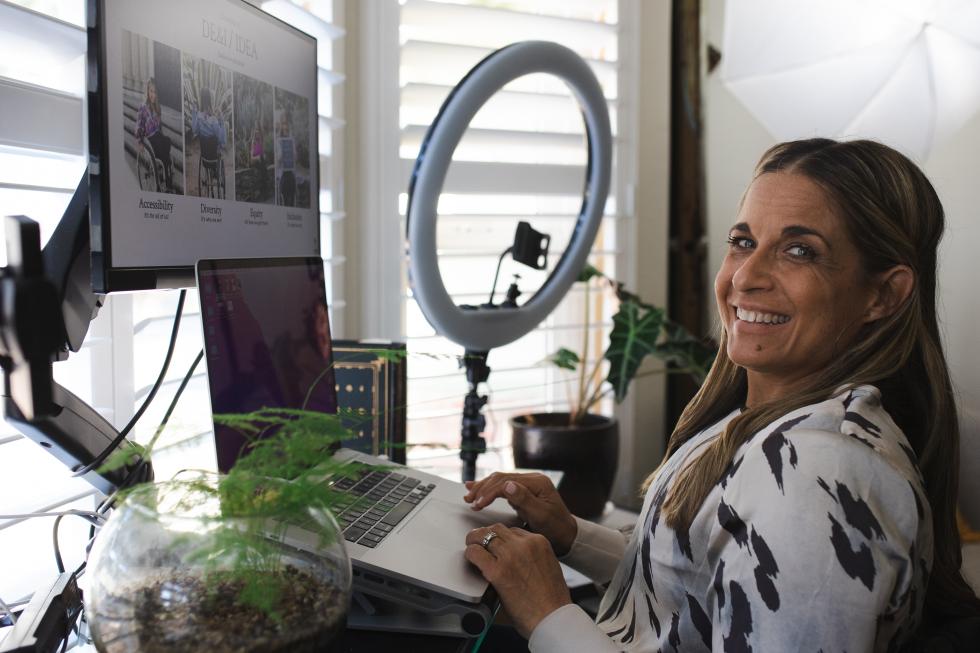
How I found my voice to start a career as a motivational speaker:
Frankly, I loved my career, and the speaking thing was kind of just a side hustle. I started speaking seriously about four years ago. I was invited to do a competition that was called Ms. Wheelchair California. I always had this drive to speak, which I’ve done every once in a while. And I thought, well, I’ll do this competition. I’m sure it would be an opportunity, if I win, to start leveraging that platform and speaking around California. I didn’t win, but I did write this really amazing speech that was about disability and stigma and women empowerment. And it just kind of opened the door for me to clearly see that I’ve got this platform and to kind of share my story and hopefully advance opportunities for other people.
After success and stability, taking a risk to try something new:
I’ve had a lot of firsts in my life. From a working perspective, every single company that I’ve worked for, honestly, I never see anybody like me. I was the first waitress in a wheelchair ever when I was in college. After I did the Paralympics thing, I came back and I started working in corporate America, and I found a path forward as an executive. And it’s something that I love. I’m really good at it. So I’ve reached heights.
I left a VP position where I was in a multi six-figure position. But over the last few years, I’ve started to have these opportunities to speak to organizations about inclusion and diversity, from a disability perspective and an accessibility perspective. So I started just kind of speaking, and my company allowed me to do it. And each time I speak I’m seeing these really impactful things happening, like disability is not necessarily a comfortable thing for people to talk about. They don’t know how to start the conversation. As I started to give these messages to organizations, there’s just light bulbs going off and there’s so many questions from the audience, and the opportunities just kept unfolding in front of me.
The first step companies need to take to embrace diversity in a more meaningful way:
Number one, I think it needs to come from leadership down. And it needs to not be looked at as a check-off-the-box item, but more embedded within the culture and the mission of the company. If the leadership believes that (diversity and accessibility) is important, that there’s ROI, that this is going to positively affect their business, retain employees, make their teams happy, make their business more creative, and all these amazing things that come of it, then it becomes very meaningful. If they believe in that and they invest in it and they hire a diverse team, I think you have to start there.
And we need to hire experts that understand these things. If you want to learn about accessibility, how to build software that is more accessible or have a company that is more diverse and understands from a disability perspective what is needed — hire people with disabilities! Start putting people like me in executive positions and on boards and having a voice so we can learn from the people who really understand what the need is and what direction we should be going in.
Repackaging my product to make my message more accessible and easily adaptable:
One of my long-on goals is to create a training module platform that I can have sort of like an add-on product to sell. When I speak to organizations, I’m going in and speaking about inclusion and disability and all the beautiful things about it. But what’s the follow up there?
All these HR departments now are rolling out these diversity, equity (and) inclusion departments, and they’re trying to fill all these gaps that we’re in this mad rush to create after the last couple years of everything that’s been going on with DEI. And I’ve been asked, do you have a training module I can buy? Can we purchase your speeches to add them to our onboarding and training programs for new hires and things like that. So I was just filming my first training module iteration, which is “Disabling Ableism: The Modern Pathway to Inclusion” micro lesson. So I’m launching that soon.
Anderson works from her home in Roseville, where she lives with
her husband and her dog.
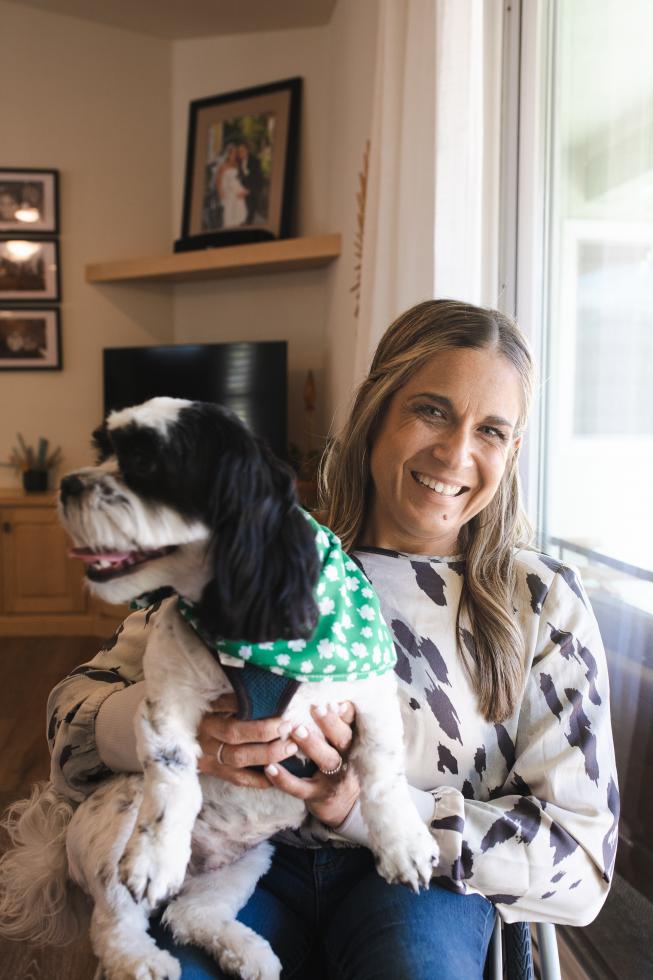
Through (the Paralympic Committee program), I published a children’s story. It’s called “William the One-Winged Dragon.” My dad and I wrote it, actually. It’s about this dragon with a disability and he plays on a soccer team. And all the dragons have disabilities, like one only has one wing, one can’t blow fire, one can’t fly. So they’re like dragon disabilities. He’s got a brother that’s playing on the (World Cup team), and they go to this tournament, and the able bodied team is losing and they integrate the dragons with disabilities, and they have all these other talents to overcome their limitations, and they end up winning by integrating everybody together.
Edited for length and clarity.
–
Stay up to date on art and culture in the Capital Region: Subscribe to the Comstock’s newsletter today.
Recommended For You
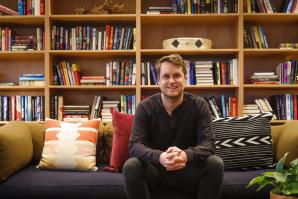
Getting to Know: Brandon Brown
The Grin CEO believes consumers have fundamentally shifted focus from companies to people
Brandon Brown is CEO and co-founder of the fast-growing
Sacramento-based company Grin. His thought leadership on
influencer marketing is based on authenticity.
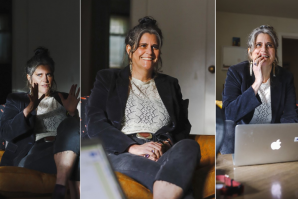
Getting to Know: Sarah Miller
A New Yorker satire writer and journalist calls Nevada City home
Freelance essayist Sarah Miller lends her idiosyncratic
style to The New Yorker website and many other
publications. The Nevada City-based writer was
commissioned by Substack to start her own
newsletter earlier this year.
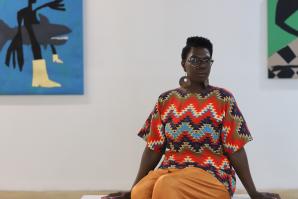
Getting to Know: Faith J. McKinnie
Gallerist Faith J. McKinnie is highlighting the work she wants to
see in her Midtown gallery that highlights contemporary art
by underrepresented artists.
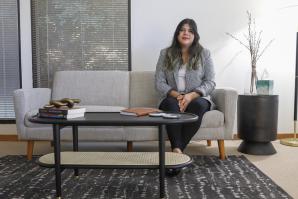
Getting to Know: Lupe Nambo
Licensed marriage and family therapist Lupe Nambo considers
it her mission to “decolonize therapy.”
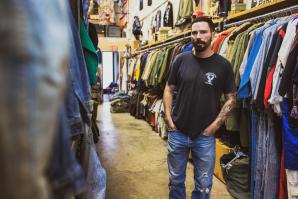
Getting to Know: Chris Bond
Tucked into a Tahoe Park warehouse is Spiders Garage, a
wonderland of vintage clothing collected and sourced by owner
Chris Bond.



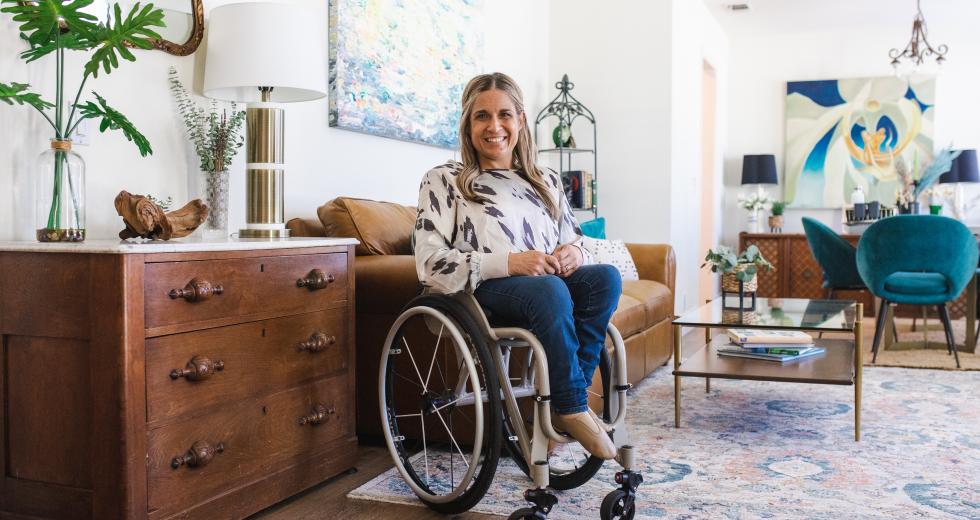
Comments
Alycia! I am SO blessed to see you thriving and TRULY making a difference in this world. I was THRILLED to read this article, overjoyed at your continued success, and will do anything and everything I can to support you! HUGS my friend! ❤️